#St Louis Writers Guild
Explore tagged Tumblr posts
Text
Ruth E. Thaler-Carter: An Author Interview
New post at The Storytelling Blog. Freelance journalist and editor Ruth E. Thaler-Carter visits the blog to talk about her writing and editing life. Lots of tips here for productivity and funneling your love of words into a paying profession. #amwriting
Editor, Writer, Publisher Ruth E. Thaler-Carter. Are you curious about journalism? Today the Storytelling Blog visits with Ruth E. “I can write anything”® Thaler-Carter, a full-time freelance journalist, writer, editor, proofreader, and desktop publisher for more than thirty-five years. Learn more about her and her services at www.writerruth.com. We talked via email about her writing and…

View On WordPress
#anthology#authors#business writing#community#editor#freelance writer#grammar#high school#journalism#journalist#money#Montag Press#nonfiction#poem#Poetry#proofreader#publishers#schedule#St Louis Writers Guild#The Big Cinch#time management#writing process
0 notes
Text
St. Louis Writers Guild Virtual Book Fair Nov 28-Dec 31 ~ All My Books Will Be There
If you have written a book and are looking for a larger audience, consider participating in the St. Louis Writers Guild Virtual Book Fair November 28 – December 31, 2023 at https://www.stlwritersguild.org/book-fair. I am honored to have been the guest speaker for the November 8 meeting of the Women In Business/Sturbridge held at Castle Cantina in Leominster, MA. Following my talk aimed at…

View On WordPress
#authors#books#Christmas#Christmas Unlocked#IN THEIR IMAGE AND LIKENESS#Lin Hourihan#Linda Hourihan#MYSTERY OF THE STURRIDGE KEYS#presents#SLWG#St. Louis Writers Guild#Sturbridge#The Virtue of Virtues#UNIVERSAL WISDOM#women in business
1 note
·
View note
Text

Happy 104th Anniversary St. Louis Writers Guild! SLWG's first meeting was held on October 28, 1920. About 30 people attended a presentation on Novel Writing. It took place in Shirley Seifert's living room. She would become SLWG's second president. Learn more at https://www.stlwritersguild.org/history or get my book The History of St. Louis Writers Guild: Celebrating a Century.
5 notes
·
View notes
Text
1928-2014
By Dr. Kelly A. Spring | 2017; Updated December 2021 by Mariana Brandman, NWHM Predoctoral Fellow in Women’s History, 2020-2022
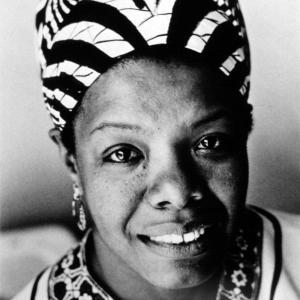
Poet, dancer, singer, activist, and scholar Maya Angelou was a world-famous author. She was best known for her unique and pioneering autobiographical writing style.
On April 4, 1928, Marguerite Ann Johnson, known to the world as Maya Angelou, was born in St. Louis, Missouri. Due to her parents’ tumultuous marriage and subsequent divorce, Angelou went to live with her paternal grandmother in Stamps, Arkansas at an early age. Her older brother, Bailey, gave Angelou her nickname “Maya.”
Returning to her mother’s care briefly at the age of seven, Angelou was raped by her mother’s boyfriend. He was later jailed and then killed when released from jail. Believing that her confession of the trauma had a hand in the man’s death, Angelou became mute for six years. During her mutism and into her teens, she again lived with her grandmother in Arkansas.
Angelou’s interest in the written word and the English language was evident from an early age. Throughout her childhood, she wrote essays, poetry, and kept a journal. When she returned to Arkansas, she took an interest in poetry and memorized works by Shakespeare and Poe.
Prior to the start of World War II, Angelou moved back in with her mother, who at this time was living in Oakland, California. She attended George Washington High School and took dance and drama courses at the California Labor School.
When war broke out, Angelou applied to join the Women’s Army Corps. However, her application was rejected because of her involvement in the California Labor School, which was said to have Communist ties. Determined to gain employment, despite being only 15 years old, she decided to apply for the position of a streetcar conductor. Many men had left their jobs to join the services, enabling women to fill them. However, Angelou was barred from applying at first because of her race. But she was undeterred. Every day for three weeks, she requested a job application, but was denied. Finally, the company relented and handed her an application. Because she was under the legal working age, she wrote that she was 19. She was accepted for the position and became the first African American woman to work as a streetcar conductor in San Francisco. Angelou was employed for a semester but then decided to return to school. She graduated from Mission High School in the summer of 1944 and soon after gave birth to her only child, Clyde Bailey (Guy) Johnson.
After graduation, Angelou undertook a series of odd jobs to support herself and her son. In 1949, she married Tosh Angelos, an electrician in the US Navy. She adopted a form of his surname and kept it throughout her life, though the marriage ended in divorce in 1952.
Angelou was also noted for her talents as a singer and dancer, particularly in the calypso and cabaret styles. In the 1950s, she performed professionally in the US, Europe, and northern Africa, and sold albums of her recordings.
In 1950, African American writers in New York City formed the Harlem Writers Guild to nurture and support the publication of Black authors. Angelou joined the Guild in 1959. She also became active in the Civil Rights Movement and served as the northern coordinator of the Southern Christian Leadership Conference, a prominent African American advocacy organization
In 1969, Angelou published I Know Why the Caged Bird Sings, an autobiography of her early life. Her tale of personal strength amid childhood trauma and racism resonated with readers and was nominated for the National Book Award. Many schools sought to ban the book for its frank depiction of sexual abuse, but it is credited with helping other abuse survivors tell their stories. I Know Why the Caged Bird Sings has been translated into numerous languages and has sold over a million copies worldwide. Angelou eventually published six more autobiographies, culminating in 2013’s Mom & Me & Mom.
She wrote numerous poetry volumes, such as the Pulitzer Prize-nominated Just Give me a Drink of Water 'fore I Diiie (1971), as well as several essay collections. She also recorded spoken albums of her poetry, including “On the Pulse of the Morning,” for which she won a Grammy for Best Spoken Word Album. The poem was originally written for and delivered at President Bill Clinton’s inauguration in 1993. She also won a Grammy in 1995, and again in 2002, for her spoken albums of poetry.
Angelou carried out a wide variety of activities on stage and screen as a writer, actor, director, and producer. In 1972, she became the first African American woman to have her screen play turned into a film with the production of Georgia, Georgia. Angelou earned a Tony nomination in 1973 for her supporting role in Jerome Kitty’s play Look Away, and portrayed Kunta Kinte’s grandmother in the television miniseries Roots in 1977.
She was recognized by many organizations both nationally and internationally for her contributions to literature. In 1981, Wake Forest University offered Angelou the Reynolds Professorship of American Studies. President Clinton awarded Angelou the National Medal of Arts in 2000. In 2012, she was a member of the inaugural class inducted into the Wake Forest University Writers Hall of Fame. The following year, she received the National Book Foundation’s Literarian Award for outstanding service to the American literary community. Angelou also gave many commencement speeches and was awarded more than 30 honorary degrees in her lifetime.
Angelou died on May 28, 2014. Several memorials were held in her honor, including ones at Wake Forest University and Glide Memorial Church in San Francisco. To honor her legacy, the US Postal Service issued a stamp with her likeness on it in 2015. (The US Postal Service mistakenly included a quote on the stamp that has long been associated with Angelou but was actually first written by Joan Walsh Anglund.)
In 2010, President Barack Obama awarded Angelou the Presidential Medal of Freedom, the country’s highest civilian honor. It was a fitting recognition for Angelou’s remarkable and inspiring career in the arts.
This woman was a woman of rape, abuse , and even a victim of racism. She stayed writing in her life as life went on and she did not ask other people to suffer either was well she was a woman of many gift. A big wake up for womens rights and also a good reflection on what is wrong with today's society. People use religion, marriage, laws and even age to determine what is and isn't rape and that is the sick culture all women have to endure. It is never a woman's fault. It happened to me recently and now I am diving back into my music arts. Even research as well . Getting different domains for different topics as well while putting my story out there . It is scary to put it out there because there are so many different things that make writing scary/
#today i learned#til#inventions#biochemistry#women in stem#electricity#mathematics#ocean#environment#sea
7 notes
·
View notes
Text

William Edmondson (c. December 1874 - February 7, 1951) was the first African American artist to have a solo show at the Museum of Modern Art, New York in 1937. He grew up near Nashville, Tennessee. Edmondson’s father, George, died when he was quite young and his mother Jane became a farm worker to support the family. He began carving tombstones and expanded his work to include sports heroes, animals, birdbaths, and figures from the Bible.
He had very little formal education and as a young man he worked for railway shops in Nashville, Chattanooga, and St. Louis. He was employed at various times as a farmhand, horse groom, orderly, fireman, and handyman. He began work as a helper for a stonemason, he discovered his talent for stone carving and built his carving tools by forging railroad spikes. In the early 1930s, he began carving tombstones for Nashville’s African American community using pieces of limestone that had been thrown away. People stopped by and bought tombstones for a few dollars. He never married.
He believed that God guided his creative endeavors and the subject matter reflected his faith. He created Martha and Mary, a sculpture based on these prominent Biblical figures. His sculpture was displayed in 1937 at his first one-person exhibition at MOMA. At the end of the exhibit, it was sold to a prominent collector. From that point, his work was recognized in national art circles.
He connected with Harlem Renaissance artist Aaron Douglas and writer James Weldon Johnson in a discussion about art and ideas. He worked as an artist on Works Progress Administration projects in Nashville (1939-41).
He had solo shows at The Montclair Art Museum The Cheekwood Fine Arts Center, The Nashville Artist Guild, and The Tennessee State Museum. His work was included in group exhibitions in DC, New York, San Francisco, and Paris. His work is in the permanent collections of The Montclair Art Museum. The University of Rochester, the San Francisco Museum of Art, and at The Hirshhorn Museum and Sculpture Garden, The National Museum of American Art, and the Smithsonian Institution. #africanhistory365 #africanexcellence
3 notes
·
View notes
Text

So, I started to rewrite this novel which I began to write back in 2015. I wasn't out then. I wasn't out even to myself. I was however a member of the St Louis Writers Guild,
and they were great. I learned a lot about writing, the business of writing, and then something more.
There was one particular meeting where they had 2 speakers who identified themselves as part of the LGBTQIA community. And they were about to teach a room full of writers and want-to-be-published authors all about pronouns. Now, at that time, though I was not out to myself as bi, I did have a race of aliens in my novel that were bi. And 2 of them, yes male and female, were part of the core group. And of course, there was a sexy scene with each. Now, in writing, the writer is an artist. An artist has to be honest, blunt, and vulnerable. So this was my subconscious bringing out the bi in me. But my conscious wasn't reacting very comfortable with the idea. I still had biphobia. So, what ended up happening is that there was a fairly early scene where the MC ended up in bed with the male alien and just refused the natural course of things. Yeah, a little drama. But that stems from my subconscious arguing with my conscious. I finished the rest of the novel but wasn't all that comfortable with it so I shelved it.
Fast forward to today, when I came out to myself and my wife and close friends and I know who and what I am, now it's time for the rewrite.
To my surprise, the rewrite is coming quite naturally to me. I'm changing the MC in that he's a bi cis male rather than a straight cis male. Then, I'll change the scene I described and alter the drama so that it's not about the gay sex but about who is being romantic with whom. At least that's the plan. It may not turn out that way, but I try for a goal and we'll see what happens.
But the novel is called Pursuit in Time. You can find it here:
Yeah, it's on Wattpad, so you can read it as I publish new content for it for free. I have 2 chapters right now and 34 to go. So thanks.
0 notes
Text

Marguerite Annie Johnson was born in St Louis, Missouri in 1928. When she was 8 years old, her mother's boyfriend sexually abused her. He ended up spending only one night in jail, but was murdered four days later, most likely by one of Johnson's uncles.
For the next 5 years, Johnson became a mute. "I thought, my voice killed him; I killed that man, because I told his name. And then I thought I would never speak again, because my voice would kill anyone."
A teacher and family friend by the name of Mrs. Bertha Flowers was the one who started to help her speak again by introducing her to books written by literary heavyweights such as Charles Dickens, William Shakespeare and Edgar Allan Poe.
The family soon moved to Oakland, California and at the age of 16, Johnson became the first first black female cable car conductor in San Francisco. She described it as her "dream job." However, in her 20s, she pivoted careers and began studying modern dance, eventually performing professionally in nightclubs around San Francisco in the early 1950s. It was during this time that Johnson decided to change her name to Maya Angelou in order to set her apart from other dancers.
From 1954 to 1955, Angelou toured Europe performing in an Opera production and made it a point to learn the languages of all the countries she visited. She became fluent in French, Spanish, Italian, Arabic, and Fanti.
In 1959, she met writer John Oliver Killens who encouraged her to move to New York City, where she joined the Harlem Writers Guild and launched her writing career, becoming an important voice for women and the black community.
In her 1969 autobiography, "I Know Why The Caged Bird Sings," Angelou writes, "There is no greater agony than bearing an untold story inside you."
0 notes
Text
The Unofficial Black History Book
Maya Angelou (1928-2014)
Trigger Warning - This chapter mentions s*xual assault, (Placed a guideline, just in case)
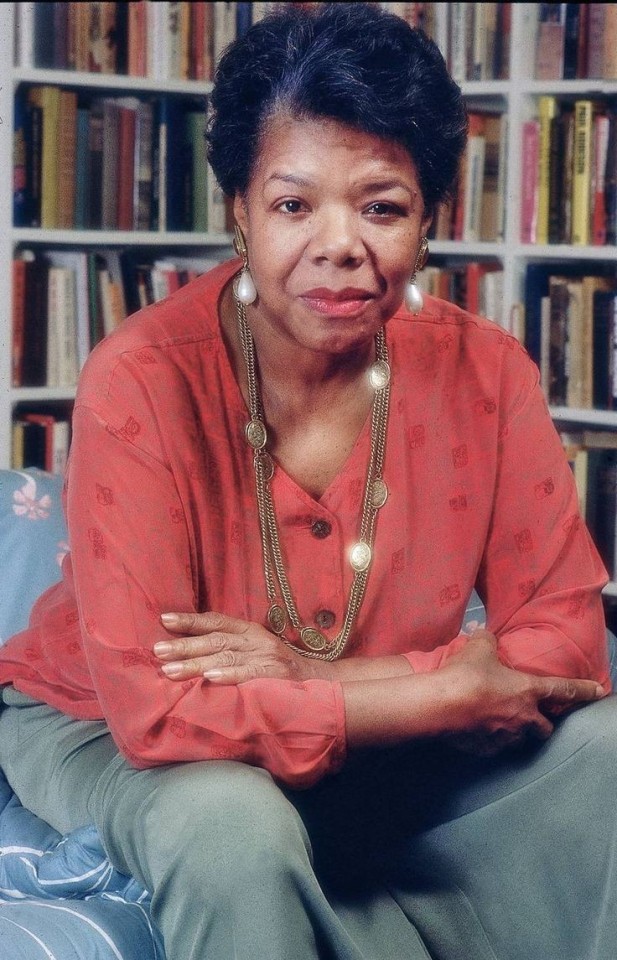

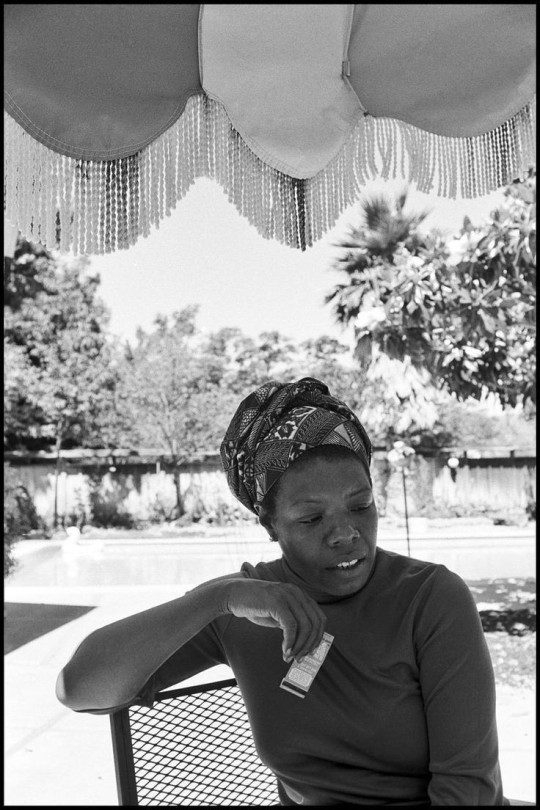
"You may not control all the events that happen to you, but you can decide not to be reduced by them." - Maya Angelou
This is her story.
Maya Angelou was not just a poet. She was an author, historian, songwriter, dancer, playwright, performer, singer, stage and screen producer, director, and Civil rights activist.
She was born Marguerite Ann Johnson on April 4, 1928, in St. Louis, Missouri. She had a difficult childhood. When her parents divorced when she was a child, she and her older brother Bailey moved to Stamps, Arkansas, to live with their grandmother, Ann Henderson. Her brother gave her the nickname "Maya," which she continued to go by.
Maya experienced firsthand racial prejudice and discrimination while she was living in Arkansas.
When she was seven, she traveled to St. Louis to see her mother and was raped by her mother's boyfriend. He was later jailed and then released.
When she spoke about the assault, her uncles banded together and killed her attacker. Traumatized and believing that her speaking about the assault caused a man's death, she became mute for almost six years and went back to live with her grandmother.
Maya has always been fascinated by the written word since she was a child. Throughout her childhood, she wrote essays and poetry and kept a journal. When she returned to Arkansas, she took an interest in poetry and memorized the works of Edgar Allan Poe and Shakespeare.
Maya moved back in with her mother, who was now living in Oakland, California, during World War II, when she was in her teens. She attended George Washington High School and received a scholarship to the California Labor School to study dance and acting.
She applied to join the Women's Army Corps during the war, but her application was denied because she had attended the California Labor School, which was rumored to have Communist ties.
Maya was only 15 years old at the time, but she was determined to find work, so she applied for a job as a streetcar conductor. With many men leaving their jobs to fight in the war, women were able to fill their positions.
Maya was initially turned down because she was a woman of color. But that did not deter her, so every day for three weeks, she requested a job application but was denied every time.
But this didn't stop her.
She eventually wore the company down, and they gave her an application. She stated on her application that she was 19 instead of 15 because she was under the legal working age. She was finally accepted for the job position and was the first African American woman to work as a streetcar conductor in San Francisco.
She was employed for at least one semester but then decided to go back to school. She graduated from Mission High School in 1944 and later gave birth to her son, Clyde Bailey 'Guy' Johnson. (He also became a poet later in his life.)
After graduation, Maya took on a bunch of odd jobs to support herself and her son. In 1949, she married Tosh Angelos, a Greek sailor who was an electrician in the US Navy. She adopted a form of his last name, "Angelou," and kept it despite their divorce in 1952.
Maya was very private about her marriages; she most likely married three times in her life.
Maya Angelou was well-known for her abilities as a singer and dancer, particularly in calypso and cabaret styles. Her performing career began in the 1950s. She was cast in a touring production of "Porgy and Bess" and later in the Off-Broadway production of "Calypso Heat Wave" (1957). She performed professionally in the United States, Europe, and North Africa.
In 1950, African American writers in New York City founded the Harlem Writers Guild to foster and support the publication of black authors.
Maya Angelou joined The Writers Guild in 1959, became involved in the Civil Rights Movement, and was the Northern Coordinator of the Southern Christian Leadership Conference, a prominent African American advocacy organization. She even organized and starred in the musical revue 'Cabaret for Freedom' as a benefit for the SCLC.
Maya appeared in an Off-Broadway production of Jean Genet's 'The Blacks' in 1961, alongside James Earl Jones, Lou Gossett Jr., and Cicely Tyson.
Angelou spent the majority of the 1960s living abroad, first in Egypt and then in Ghana. She was working as an editor and as a freelance writer. During her time at the University of Ghana, she worked as a lecturer. While in Ghana, she also joined a community of "Revolutionist Returnees", discovering Pan-Africanism.
She became close friends with Malcolm X as well. When she returned to the United States in 1964, she assisted Malcolm X in establishing the Organization of Afro-American Unity, which was later disbanded following his death the following year.
Maya and Martin Luther King Jr. were also close friends. When he was assassinated on her birthday, April 4, 1968, she stopped celebrating her birthday for years afterward. Instead, she sent flowers to Coretta Scott King, Martin's widow, for over 30 years until Coretta's death in 2006.
In 1969, Maya Angelou published 'I know why the caged bird sings', a memoir about her early life. Her friend and fellow African-American writer James Baldwin encouraged her to write her autobiography.
As the first nonfiction bestseller by an African-American woman, her story of personal strength in the face of childhood trauma and racism made literary history.
It was nominated for a National Book Award, and while many schools tried to ban it due to the vivid depiction of sexual abuse, it was credited with assisting other Sexual Abuse survivors in telling their own stories.
'I know why the caged bird sings' made Maya Angelou an international star. It's been translated into many languages, has sold over a million copies worldwide, and continues to be her most popular autobiographical work. She went on to publish six more autobiographies.
Maya published a number of poetry collections, including "Just Give Me a Drink of Water 'fore I Diiie' (1971), which was nominated for a Pulitzer Prize, as well as several essay collections. She also recorded spoken word albums of her poetry, including 'On the Pulse of the Morning,’ and won a Grammy for Best Spoken Word Album. The poem was originally written for and delivered at Bill Clinton's inauguration in 1993.
She received another Grammy in 1995 and another in 2002 for her spoken poetry albums.
With the production of 'Georgia, Georgia' in 1972, Maya became the first African-American woman to have her screenplay turned into a film. In 1973, she received a Tony nomination for her supporting role in Jerome Kitty's play, 'Look away.' In 1976, she wrote 'Singin' and swingin' and 'Gettin' Merry Like Christmas," autobiographies about her early career as a singer and actress. And played Kunta Kinte's grandmother in the TV miniseries 'Roots' in 1977.
'The Heart of a Woman,' her memoir about leaving California with her son for New York and participating in the Civil Rights Movement, was published in 1981.
In 1986, she wrote "All God's Children Need Traveling Shoes," a lyrical exploration of her years spent living in Ghana and what it means to be an African-American in Africa.
In 1994, she wrote "Wouldn't Take Nothing for My Journey Now," a collection of inspirational essays that features Maya's insights about spirituality and living well.
In 2002, she wrote 'A Song Flew Up to Heaven', an autobiographical work that explores Maya's return from Africa to the States and her struggle to cope with the assassinations of her close friends, Dr. King and Malcolm X. The book even ends when, at the encouragement of James Baldwin, she begins to work on 'I know why the caged bird sings'.
In 2008, she wrote 'Letter to My Daughter'. It was dedicated to the daughter she never had and features essays of her own advice for young women about living a life with meaning.
In 2013, she wrote 'Mom & Me & Mom', a memoir where she discusses her complicated relationship with a mother who abandoned her during childhood.
Maya also published cookbooks. Interested in health, she published. "Hallelujah! The Welcome Table: A Lifetime of Memories with Recipes" (2005). And 'Great food, all day long' (2010).
Maya Angelou was honored by numerous organizations both nationally and internationally for her contributions to literature. Wake Forest University appointed her to the Reynolds Professorship of American Studies in 1981. And in 2000, President Clinton awarded Maya Angelou the National Medal of Arts.
Maya was awarded the Presidential Medal of Freedom by President Barack Obama in 2011, the country's highest civilian honor.
In 2012, she was a member of the inaugural class inducted into the Wake Forest University Writers Hall of Fame. She received the National Book Foundation's Literary Community Award the following year. She also gave many commencement speeches and was awarded more than 30 honorary degrees in her lifetime.
On May 28th, 2014, Maya Angelou died at the age of 86 in Winston-Salem, North Carolina. In her honor, memorial services were held at Wake Forest University and Glide Memorial Church in San Francisco.
In honor of her legacy, the US Postal Service issued a stamp with her likeness on it in 2015.
President Obama issued a statement about Maya Angelou, calling her "a brilliant writer, a fierce friend, and a truly phenomenal woman. Angelou had the ability to remind us that we are all God's children and that we all have something to offer." He wrote.
In May 2021, it was announced that Maya Angelou would be one of the first women to be honored with a new series of quarters from the United States Mint.
Maya Angelou was truly a phenomenal woman.
_
Previous
Clara Hale
Next
Ruby Bridges
___
My Resources
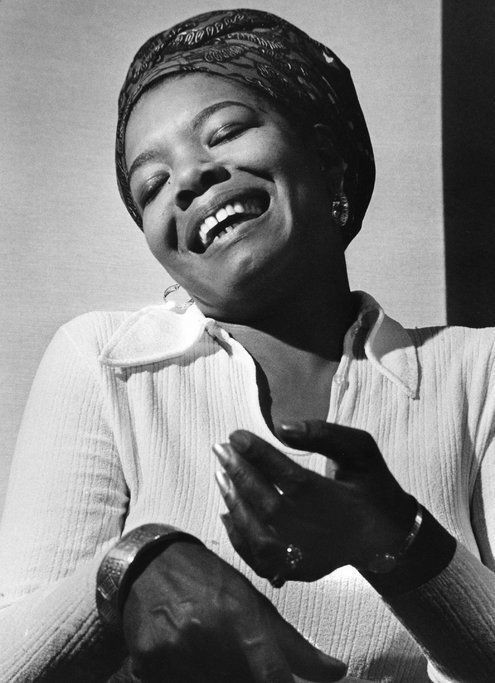
#the unofficial black history book#black history matters#black female poets#black female writers#protect black girls#protect black children#black history is american history#black culture#black excellence#black tumblr#know your history#learn your roots#black icons#maya angelou#black poets#black writers of tumblr#black writblr#writblr#civil rights movement#black community#black women appreciation#herstory#history#black women#black poetry#black activism#writing community#black representation#social justice
1 note
·
View note
Text
Maya Angelou
1928-2014
By Dr. Kelly A. Spring | 2017; Updated December 2021 by Mariana Brandman, NWHM Predoctoral Fellow in Women’s History, 2020-2022
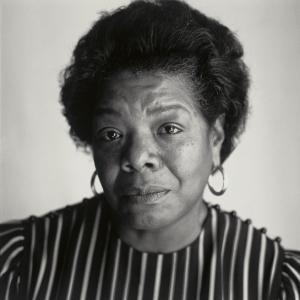
Poet, dancer, singer, activist, and scholar Maya Angelou was a world-famous author. She was best known for her unique and pioneering autobiographical writing style.
On April 4, 1928, Marguerite Ann Johnson, known to the world as Maya Angelou, was born in St. Louis, Missouri. Due to her parents’ tumultuous marriage and subsequent divorce, Angelou went to live with her paternal grandmother in Stamps, Arkansas at an early age. Her older brother, Bailey, gave Angelou her nickname “Maya.”
Returning to her mother’s care briefly at the age of seven, Angelou was raped by her mother’s boyfriend. He was later jailed and then killed when released from jail. Believing that her confession of the trauma had a hand in the man’s death, Angelou became mute for six years. During her mutism and into her teens, she again lived with her grandmother in Arkansas.
Angelou’s interest in the written word and the English language was evident from an early age. Throughout her childhood, she wrote essays, poetry, and kept a journal. When she returned to Arkansas, she took an interest in poetry and memorized works by Shakespeare and Poe.
Prior to the start of World War II, Angelou moved back in with her mother, who at this time was living in Oakland, California. She attended George Washington High School and took dance and drama courses at the California Labor School.
When war broke out, Angelou applied to join the Women’s Army Corps. However, her application was rejected because of her involvement in the California Labor School, which was said to have Communist ties. Determined to gain employment, despite being only 15 years old, she decided to apply for the position of a streetcar conductor. Many men had left their jobs to join the services, enabling women to fill them. However, Angelou was barred from applying at first because of her race. But she was undeterred. Every day for three weeks, she requested a job application, but was denied. Finally, the company relented and handed her an application. Because she was under the legal working age, she wrote that she was 19. She was accepted for the position and became the first African American woman to work as a streetcar conductor in San Francisco. Angelou was employed for a semester but then decided to return to school. She graduated from Mission High School in the summer of 1944 and soon after gave birth to her only child, Clyde Bailey (Guy) Johnson.
After graduation, Angelou undertook a series of odd jobs to support herself and her son. In 1949, she married Tosh Angelos, an electrician in the US Navy. She adopted a form of his surname and kept it throughout her life, though the marriage ended in divorce in 1952.
Angelou was also noted for her talents as a singer and dancer, particularly in the calypso and cabaret styles. In the 1950s, she performed professionally in the US, Europe, and northern Africa, and sold albums of her recordings.
In 1950, African American writers in New York City formed the Harlem Writers Guild to nurture and support the publication of Black authors. Angelou joined the Guild in 1959. She also became active in the Civil Rights Movement and served as the northern coordinator of the Southern Christian Leadership Conference, a prominent African American advocacy organization
In 1969, Angelou published I Know Why the Caged Bird Sings, an autobiography of her early life. Her tale of personal strength amid childhood trauma and racism resonated with readers and was nominated for the National Book Award. Many schools sought to ban the book for its frank depiction of sexual abuse, but it is credited with helping other abuse survivors tell their stories. I Know Why the Caged Bird Sings has been translated into numerous languages and has sold over a million copies worldwide. Angelou eventually published six more autobiographies, culminating in 2013’s Mom & Me & Mom.
She wrote numerous poetry volumes, such as the Pulitzer Prize-nominated Just Give me a Drink of Water 'fore I Diiie (1971), as well as several essay collections. She also recorded spoken albums of her poetry, including “On the Pulse of the Morning,” for which she won a Grammy for Best Spoken Word Album. The poem was originally written for and delivered at President Bill Clinton’s inauguration in 1993. She also won a Grammy in 1995, and again in 2002, for her spoken albums of poetry.
Angelou carried out a wide variety of activities on stage and screen as a writer, actor, director, and producer. In 1972, she became the first African American woman to have her screen play turned into a film with the production of Georgia, Georgia. Angelou earned a Tony nomination in 1973 for her supporting role in Jerome Kitty’s play Look Away, and portrayed Kunta Kinte’s grandmother in the television miniseries Roots in 1977.
She was recognized by many organizations both nationally and internationally for her contributions to literature. In 1981, Wake Forest University offered Angelou the Reynolds Professorship of American Studies. President Clinton awarded Angelou the National Medal of Arts in 2000. In 2012, she was a member of the inaugural class inducted into the Wake Forest University Writers Hall of Fame. The following year, she received the National Book Foundation’s Literarian Award for outstanding service to the American literary community. Angelou also gave many commencement speeches and was awarded more than 30 honorary degrees in her lifetime.
Angelou died on May 28, 2014. Several memorials were held in her honor, including ones at Wake Forest University and Glide Memorial Church in San Francisco. To honor her legacy, the US Postal Service issued a stamp with her likeness on it in 2015. (The US Postal Service mistakenly included a quote on the stamp that has long been associated with Angelou but was actually first written by Joan Walsh Anglund.)
In 2011, President Barack Obama awarded Angelou the Presidential Medal of Freedom, the country’s highest civilian honor. It was a fitting recognition for Angelou’s remarkable and inspiring career in the arts.
0 notes
Text
Patreon: One Week Picture Book Challenge

So it's Monday and Day 1 of a little challenge I'm giving myself. I'm attempting to create a complete picture book from concept to publication in five days! It's going to be a lot of work, but I've done it before with the previous entry to this picture book series: You Are a Writer! Which I created to help raise money for the St. Louis Writers Guild.
If you want to follow along with my daily progress, you can sub at any level to get the updates. If you're interested in whether I succeed... I'll post about it on Friday :)
Follow me on patreon here!
17 notes
·
View notes
Text
Living Your Best Writing Conference
In a fit of enthusiasm last fall, I registered for a big, well-regarded writing conference, the Association of Writers and Writing Programs (AWP), But as the time to head out to Kansas City drew near, I found myself more and more second-guessing the decision; my cold feet had nothing to do with the conference offerings and everything to do with my interior emotional landscape. I reflect on all…

View On WordPress
#An Author&039;s Journal#Association of Writers#AWP#Bookfair#Cassie Mothwin#Cat Rambo blog#comics#Dane G. Kroll#Field Guild to Graphic Literature#India#Kelcey Ervick#Lauren Haldeman#Lynda Barry#Michael Nye#Montag Press#neurotic#Nick Francis Potter#Raghav Rao#Realm of Goryo#Rose Metal Press#Science Fiction and Fantasy Writers Association#SFFWA#St. Louis Writers Guild#Story Magazine#Tangled Blessings#The Big Cinch#Tiny Spoon#Typewriter Tarot
0 notes
Text
Maya Angelou
Let me tell you one of the most soulful people I've learned about, Maya Angelou. She's an absolute queen with so much perseverance and wisdom. I don't think I've learned about someone with so many quirks in numerous areas from writing to dancing, to directing, to singing; she's amazing so please give this a read.
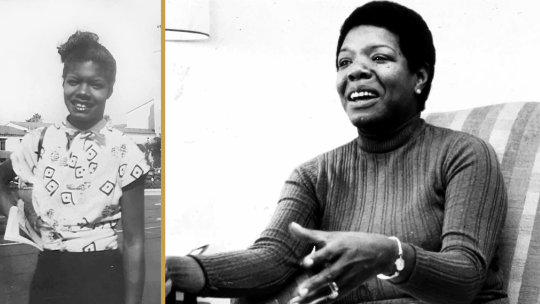
First, who is Maya Angelou? A brief preview.
An African-American author, a poet, a singer, an activist, a scholar, a scriptwriter, an actress, and a dancer
Best known for her unique and pioneering autobiographical style
Born on April 4th, 1928 and died on May 28th, 2014
She was born in St. Louis, Missouri
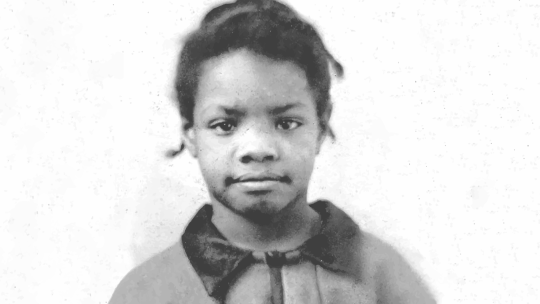
Maya's Traumatic Early Life
At an early age, Maya was sent to live at her grandmother’s place in Stamps, Arkansas because of her parents tumultuous marriage and eventual divorce
It was her older brother, Bailey, who gave her the nickname “Maya”
Living with her grandmother helped her develop pride and self-confidence
When she returned to her mother’s care briefly at the age of 7, she was raped by her mother’s boyfriend
When he was jailed and released not a day later, he was killed
Traumatized by his death, she later said, “I thought my voice killed him; I killed that man because I told his name. And then I thought I would never speak again because my voice would kill anyone …”
She became mute for 5 years, her usual lustrous personality crushed
She returned to live with her grandma through her teens and during the times she was mute, she holed herself in libraries, memorizing all books line by line like Shakespeare’s plays and sonnets, and Poe’s poetry; thought to be the beginning to her love for literature and writing
Her Literary Career/Famous Works
“I Know Why the Caged Bird Sings” (1969)
Her most critically acclaimed book, spanning her childhood as she and her brother bounced back and forth from her mother's place to her grandmother's
She wrote this during her time with the Harlem Writers Guild, a safe community that supported African writers, in NYC
It narrated her experiences with racism, molestation, rape, and her chronic displacement
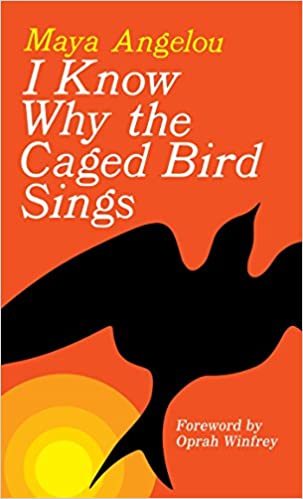
“Gather Together In My Name” (1974)
follows after "I Know Why The Caged Bird Sings" when Angelou was 17-19 years old
the book depicts a single mother's slide down the social ladder into poverty and crime
the title was from the Bible but it also conveyed how a Black female lived in the white dominated society of the US after WWII
its themes were motherhood and family, racism and identity, education and literacy
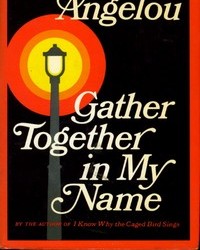
“Just Give Me a Cool Drink of Water ‘fore I Diiie” (1971)
Angelou's first collection of poetry
many of the poems were song lyrics, inspired at Angelou's time in her life when she was nightclub singer in her 20s
it was nominated for a Pulitzer Prize in 1972

“Mom & Me & Mom” (2013)
her final book and 7 book memoir series that focused on her relationship with her mother
it covered her budding relationship with her mother when she was young with themes of reconciliation and reunion
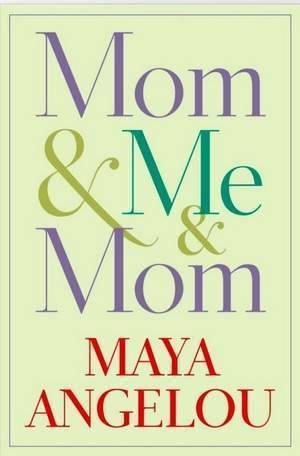
Interesting Trivia
She was the first Black female street car conductor when she persisted for work at San Francisco in high school; “I loved the uniforms”, she had explained.
She was a civil activist, advocating for African-American rights as the northern coordinator of the Southern Christian Leadership Conference
After working as a dancer a club in San Diego, she had a short lived personal sex history but quit after she bought her first car, a 1939 pale-green Chrysler convertible
In 1972, she was the first African American to have her screenplay turned into a film, “Georgia, Georgia”; she’s also had a wide variety of singing, dancing, acting, and directing and producing shows and movies
She was besties with Martin Luther King Jr. and after his death, she sent flowers to his wife for more than 30 years until her death
She’s also very close friends with Oprah Winfrey, appearing on her show twice, and giving her life-changing advice during her hardships
Reflection
I had the chance to read Angelou's final book "Mom & Me & Mom" and I think it really showed a lot of how Angelou was the person she was today. Her mother, like her, was a very strong willed woman who had taught her how to be independent, to be courageous, and proud in such oppressive society. They were like two peas in a pod, two women who came together with their stories of experience, and teaching one another how to love themselves, to be empowered, and courageous. I related to the story with my own close relationship with my mother. Like Angelou and her mother, my mother and I were like a student and mentor and best friends all while still being parent and daughter. It made me appreciate and love my mother, and really keep the things she taught me close to my heart. This book was so monumentally relatable, I had to order my own copy to annotate it with my own experiences.
Angelou was a woman who wanted others to be strong, to be courageous, to love themselves, and see their misery and hard times as new opportunities that would being them happiness. Her personality was bright even when she was quite old, and she was so animated and influential, it's hard to be distracted if you watch her interviews. Like many female authors, Angelou's experiences have impacted the way she wrote her books; but her soulful autobiographical style makes her books unique; it doesn't seem like it's about the author, but a character who the reader can relate to and follow along her joys and miseries.
Thank you for reading this far and please give Maya Angelou's books a read. She has wisdom that society needs during these times of turmoil.
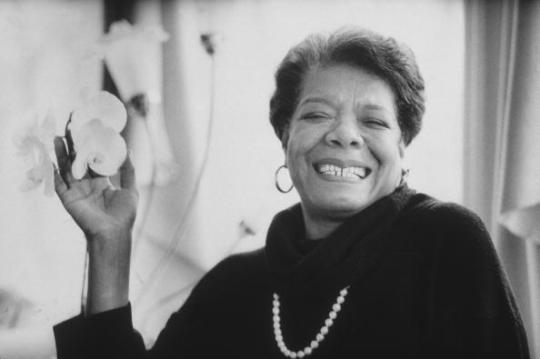
References:
A. Spring, Kelley. “Maya Angelou.” National Women’s History Museum, 2017, www.womenshistory.org/education-resources/biographies/maya-angelou.
Edmund, Aiyana. “10 Fascinating Facts About Maya Angelou.” Literary Ladies Guide, 22 Feb. 2018, www.literaryladiesguide.com/literary-musings/10-fascinating-facts-maya-angelou.
“Maya Angelou.” Biography, A&E Television Networks, www.biography.com/writer/maya-angelou.
Gibson, Megan. “A Guide to Maya Angelou’s Most Beloved Books.” Time, TIME USA, LLC, 28 May 2014, time.com/123030/maya-angelou-best-books.
“Maya Angelou Biography - Life, Children, Parents, Name, Story, Death, School, Mother, Young.” Encyclopedia of World Biography, Advameg, Inc, www.notablebiographies.com/An-Ba/Angelou-Maya.html.
3 notes
·
View notes
Text
Robert Hooks
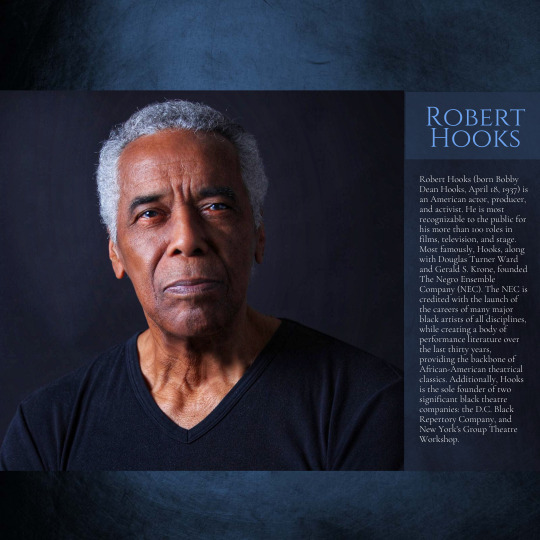
Robert Hooks (born Bobby Dean Hooks, April 18, 1937) is an American actor, producer, and activist. He is most recognizable to the public for his more than 100 roles in films, television, and stage. Most famously, Hooks, along with Douglas Turner Ward and Gerald S. Krone, founded The Negro Ensemble Company (NEC). The NEC is credited with the launch of the careers of many major black artists of all disciplines, while creating a body of performance literature over the last thirty years, providing the backbone of African-American theatrical classics. Additionally, Hooks is the sole founder of two significant black theatre companies: the D.C. Black Repertory Company, and New York's Group Theatre Workshop.
Biography
Early life
The youngest of five children, Hooks was born in Foggy Bottom, Washington, D.C. to Mae Bertha (née Ward), a seamstress, and Edward Hooks who had moved from Rocky Mount, North Carolina with their four other children, Bernice, Caroleigh, Charles Edward "Charlie", and James Walter "Jimmy". Named Bobby Dean Hooks at birth, Robert was their first child born "up-north" and the first to be born in a hospital. His father, Edward, died in a work accident on the railroad in 1939.
Hooks attended Stevens Elementary School. In 1945, at the insistence of his sister Bernice who was doing community arts outreach for youngsters at Francis Junior High School, he performed the lead in his first play, The Pirates of Penzance, at the age of nine. From the ages of 6 to 12, Bobby Dean journeyed with his siblings to Lucama, North Carolina to work the tobacco fields for his uncle's sharecropping farm as a way to help earn money for the coming school year in D.C.
In 1954, just as Brown vs. Board of Education was being implemented in the north, he moved to Philadelphia to be with his mother, her second husband, and his half-sister, Safia Abdullah (née Sharon Dickerson). Hooks experienced his first integrated school experience at West Philadelphia High School. Hooks soon joined the drama club and began acting in plays by William Shakespeare and Samuel Beckett. He was graduated in 1956, passing on a scholarship to Temple University in order to pursue a career as a stage actor at the Bessie V. Hicks School of Theatre (alongside Charles Dierkop and Bruce Dern, with whom he second-acted plays doing their pre-Broadway tryouts in Philadelphia) while working at Browning King, a men's tailor shop at Fourteenth and Chestnut streets.
Career
Having trained at the Bessie V. Smith School of Theatre in Philadelphia, and after seeing A Raisin in the Sun in its Philadelphia tryout in February 1959, Hooks moved to New York to pursue acting. In April 1960, as Bobby Dean Hooks, he made his Broadway debut in A Raisin in the Sun replacing Louis Gossett, Jr. who would be doing the film version. He then continued to do its national tour. He then stepped into the Broadway production of A Taste of Honey, replacing Billy Dee Williams; then repeating the same national tour trajectory as he had done for "Raisin..." the previous year. In early 1962 he next appeared as the lead in Jean Genet's The Blacks, replacing James Earl Jones as the male lead, leaving briefly that same year to appear on Broadway again in Tiger, Tiger, Burning Bright before stepping back into the lead role in The Blacks in 1963. He then returned to Broadway, first in Ballad for Bimshire and then in the short-lived 1964 David Merrick revival of The Milk Train Doesn't Stop Here Any More (as a character created by Tennessee Williams for this revival) and starring Tallulah Bankhead and Tab Hunter in his only stage performance. Immediately thereafter, in March 24, 1964 he originated the role of Clay in Amiri Baraka's Dutchman. With this play, on the advice of Roscoe Lee Brown, Hooks became known as, Robert Hooks. He also originated roles on the New York stage in Where's Daddy? for which he won the Theatre World Award and he was nominated for Best Male Lead in a Musical for Hallelujah Baby while he was simultaneously starring in David Susskind's N.Y.P.D.—the first African American lead on a television drama.
In 1968 Hooks was the host of the new public affairs television program, Like It Is.
Hooks was nominated for a Tony for his lead role in the musical, Hallelujah, Baby!, has received both the Pioneer Award and the NAACP Image Award for Lifetime Achievement, and has been inducted into the Black Filmmakers Hall of Fame. He also won an Emmy for his PBS special, Voices of Our People.
Significant roles for which Hooks is known include Reeve Scott in Hurry Sundown (1967), Mr. T. in the blaxploitation film Trouble Man (1972), grandpa Gene Donovan in the comedy Seventeen Again (2000), and Fleet Admiral Morrow in Star Trek III: The Search for Spock (1984). He also appeared on television in an episode of the NBC crime drama series The Eddie Capra Mysteries in 1978 and portrayed Doctor Walcott in the 1980s television series Dynasty.
Activism
Arts and Culture
In 1964, as a result of a speaking engagement at the Chelsea Civil Rights Committee (then connected to the Hudson Guild Settlement House) he founded The Group Theatre Workshop (GTW), a tuition-free environment for disadvantaged urban teens who expressed a desire to explore acting. Among the instructors were Barbara Ann Teer, Frances Foster, Hal DeWindt, Lonne Elder III, and Ronnie Mack. Alumni include Antonio Fargas, Hattie Winston, and Daphne Maxwell Reid.
The Group Theatre Workshop was folded into the tuition-free training arm of the The Negro Ensemble Company (NEC) founded in 1967 with Douglas Turner Ward and Gerald S. Krone with a $1.3 million grant from the Ford Foundation under the auspices of W. McNeil Lowry.
From 1969-1972, Hooks served as an original board member of Black Academy of Arts and Letters (BAAL) (located in New York) alongside C. Eric Lincoln, President; John O. Killens, Alvin F. Poussaint, and Charles White. Chartered by the State of New York, BAAL's mission was to bring together Black artists and scholars from around the world. Additional members included: Julian Adderley, Alvin Ailey, Margaret Walker, James Baldwin, Imamu Baraka, Romare Bearden, Harry Belafonte, Lerone Bennett, Arna Bontemps, Ossie Davis, Ruby Dee Davis, St. Clair Drake, Ernest Dunbar, Katherine Dunham, Lonne Elder III, Duke Ellington, Alex Haley, Ruth Inge Hardison, Vertis Hayes, Chester Himes, Lena Horne, Jacob Lawrence, Elma Lewis, Henry Lewis, Paule Marshall, Donald McKayle, Arthur Mitchell, Frederick O’Neal, Gordon Parks, Sidney Poitier, Benjamin Quarles, Lloyd Richards, Lucille D. Roberts, and Nina Simone.
In response to the violence in his home town of Washington, D.C. in the wake of the Rev. Dr. Martin Luther King, Jr.'s assassination, and aided by a small grant from the Eugene and Agnes E. Meyer Foundation, Hooks took a leave of absence from the Negro Ensemble Company to create The D.C. Black Repertory Company (DCBRC, 1970-1981). As Founder and Executive Director, the DCBRC was intended as a further exploration of the ability of the arts to create healing. The a capella group Sweet Honey in the Rock was created and developed within its workshop process.
The Inner Voices (Lorton Prison arts training program, 1971) proved to be a result of the beneficial effect of the DCBRC in the D.C. area. In response to a direct plea from an inmate, Rhozier "Roach" Brown, who was serving a life sentence in Lorton, Hooks' D.C. Black Repertory Company structured the first prison-based arts program in the United States. While it is the norm now, it was then a revolutionary attempt at rehabilitation through the arts. Eventually The Inner Voices performed more than 500 times in other prisons, including a Christmas special entitled, "Holidays, Hollowdays." Due to Roach's work, President Gerald Ford commuted his sentence on Christmas Day, 1975.
His relocation to the West Coast redirected Hooks' approach to parity in the arts with his involvement with The Bay Area Multicultural Arts Initiative (1988) as a board member and grant facilitator-judge. Funded by monies from a unique coalition made up of the San Francisco Foundation (a community foundation); Grants for the Arts of the San Francisco Hotel Tax Fund, and The National Endowment for the Arts, the function of this organization was the funding of deserving local multicultural arts organizations.
In 1992, Hooks co-founded (with writer Lonne Elder III) Arts in Action. Located in South Central Los Angeles, this was a film and television training center established to guide individuals who aspired to careers in film production. It formulated strategies and training for securing entry-level jobs. Courses included: career development workshops; pre-production and production for film and television; creative problem solving in production management; directing for stage and screen—principles and practices; also the craft of assistant directors, script supervisor, technicians, wardrobe, make-up, etc.
The Negro Ensemble Company of Los Angeles (NEC-LA) (1994-1997) was created because so many New York members and original members had relocated to the west coast. Hooks, as founder and executive director enlisted alumni from his New York Negro Ensemble Company to serve as board members: Denise Nicholas, Denzel Washington, James Earl Jones, Laurence Fishburne, Richard Roundtree, Samuel L. Jackson. NEC-LA's goal was to be a new and innovative multi-ethnic cultural project that strived to achieve the community effectiveness and professional success of its parent organization.
Personal life
Hooks is the father of actor, television and film director Kevin Hooks. He married Lorrie Gay Marlow (actress, author, artist) on June 15, 2008. Previously, he was married to Yvonne Hickman and Rosie Lee Hooks.
Awards
1966 - Theatre World Award (1965–66 ) for "Where's Daddy?" (The Billy Rose Theatre)
1979 - American Black Achievement Award - Ebony Magazine
1982 - Emmy Award for Producing (1982) Voices of Our People: In Celebration of Black Poetry (KCET-TV/PBS)
1966 - Tony Nomination, Lead Role in a Musical for Hallelujah, Baby
1985 - Inducted into The Black Filmmakers Hall of Fame, recipient Oscar Micheaux Award (1985)
1986 - March 2nd declared Robert Hooks Day by the City of Los Angeles, Mayor Tom Bradley
1987 - Excellence in Advertising and Communications to Black Communities from CEBA (Excellence in Advertising and Communications to Black Communities)
2000 - Honorary Doctor of Humane Letters, Honoris Causa honorary degree, Bowie State University
2000 - May 25th declared Robert Hooks Day in Washington, D.C.
2005 - Beverly Hills/Hollywood Chapter NAACP Image Award for Lifetime Achievement
2005 - Beverly Hills/Hollywood Chapter NAACP Trailblazer Award to the Negro Ensemble Company
2005 - Trailblazer Award – City of Los Angeles
2006 - The Black Academy of Arts and Letters (TBAAL), Lifetime Achievement Award (Dallas)
2007 - The Black Theatre Alliance Awards / Lifetime Achievement Award
2015 - Living Legend Award (2015) National Black Theatre Festival
2018 - October 18th proclaimed Robert Hooks Day by Mayor Muriel Bowser, Washington, D.C.
2018 - Hooks is entered into The Congressional Record by the Hon. Eleanor Holmes Norton, September 4, 2018, Vol. 164
2018 - Visionary Founder and Creator Award - D.C. Black Repertory Company on its 47th anniversary
Acting Credits
Film
Sweet Love, Bitter (1967) .... Keel Robinson
Hurry Sundown (1967) .... Reeve Scott
Last of the Mobile Hot Shots (1970) .... Chicken
Carter's Army (1970) .... Lt. Edward Wallace
Trouble Man (1972) .... Mr. T
Aaron Loves Angela (1975) .... Beau
Airport '77 (1977) .... Eddie
Fast-Walking (1982) .... William Galliot
Star Trek III: The Search for Spock (1984) .... Admiral Morrow
Passenger 57 (1992) .... Dwight Henderson
Posse (1993) .... King David
Fled (1996) .... Lt. Clark
10 notes
·
View notes
Text

St. Louis Writers Guild's Short Story Contest Opens October 1 - Deadline December 1 More information at www.stlwritersguild.org/short-story
8 notes
·
View notes
Text
Maya Angellou
Poet, dancer, singer, activist, and scholar Maya Angelou was a world-famous author. She was best known for her unique and pioneering autobiographical writing style.
On April 4, 1928, Marguerite Ann Johnson, known to the world as Maya Angelou, was born in St. Louis, Missouri. Due to her parents’ tumultuous marriage and subsequent divorce, Angelou went to live with her paternal grandmother in Stamps, Arkansas at an early age. Her older brother, Bailey, gave Angelou her nickname “Maya.”
Returning to her mother’s care briefly at the age of seven, Angelou was raped by her mother’s boyfriend. He was later jailed and then killed when released from jail. Believing that her confession of the trauma had a hand in the man’s death, Angelou became mute for six years. During her mutism and into her teens, she again lived with her grandmother in Arkansas.
Angelou’s interest in the written word and the English language was evident from an early age. Throughout her childhood, she wrote essays, poetry, and kept a journal. When she returned to Arkansas, she took an interest in poetry and memorized works by Shakespeare and Poe.
Prior to the start of World War II, Angelou moved back in with her mother, who at this time was living in Oakland, California. She attended George Washington High School and took dance and drama courses at the California Labor School.
When war broke out, Angelou applied to join the Women’s Army Corps. However, her application was rejected because of her involvement in the California Labor School, which was said to have Communist ties. Determined to gain employment, despite being only 15 years old, she decided to apply for the position of a streetcar conductor. Many men had left their jobs to join the services, enabling women to fill them. However, Angelou was barred from applying at first because of her race. But she was undeterred. Every day for three weeks, she requested a job application, but was denied. Finally, the company relented and handed her an application. Because she was under the legal working age, she wrote that she was 19. She was accepted for the position and became the first African American woman to work as a streetcar conductor in San Francisco. Angelou was employed for a semester but then decided to return to school. She graduated from Mission High School in the summer of 1944 and soon after gave birth to her only child, Clyde Bailey (Guy) Johnson.
After graduation, Angelou undertook a series of odd jobs to support herself and her son. In 1949, she married Tosh Angelos, an electrician in the US Navy. She adopted a form of his surname and kept it throughout her life, though the marriage ended in divorce in 1952.
Angelou was also noted for her talents as a singer and dancer, particularly in the calypso and cabaret styles. In the 1950s, she performed professionally in the US, Europe, and northern Africa, and sold albums of her recordings.
In 1950, African American writers in New York City formed the Harlem Writers Guild to nurture and support the publication of Black authors. Angelou joined the Guild in 1959. She also became active in the Civil Rights Movement and served as the northern coordinator of the Southern Christian Leadership Conference, a prominent African American advocacy organization
In 1969, Angelou published I Know Why the Caged Bird Sings, an autobiography of her early life. Her tale of personal strength amid childhood trauma and racism resonated with readers and was nominated for the National Book Award. Many schools sought to ban the book for its frank depiction of sexual abuse, but it is credited with helping other abuse survivors tell their stories. I Know Why the Caged Bird Sings has been translated into numerous languages and has sold over a million copies worldwide. Angelou eventually published six more autobiographies, culminating in 2013’s Mom & Me & Mom.
She wrote numerous poetry volumes, such as the Pulitzer Prize-nominated Just Give me a Drink of Water 'fore I Diiie (1971), as well as several essay collections. She also recorded spoken albums of her poetry, including “On the Pulse of the Morning,” for which she won a Grammy for Best Spoken Word Album. The poem was originally written for and delivered at President Bill Clinton’s inauguration in 1993. She also won a Grammy in 1995, and again in 2002, for her spoken albums of poetry.
Angelou carried out a wide variety of activities on stage and screen as a writer, actor, director, and producer. In 1972, she became the first African American woman to have her screen play turned into a film with the production of Georgia, Georgia. Angelou earned a Tony nomination in 1973 for her supporting role in Jerome Kitty’s play Look Away, and portrayed Kunta Kinte’s grandmother in the television miniseries Roots in 1977.
She was recognized by many organizations both nationally and internationally for her contributions to literature. In 1981, Wake Forest University offered Angelou the Reynolds Professorship of American Studies. President Clinton awarded Angelou the National Medal of Arts in 2000. In 2012, she was a member of the inaugural class inducted into the Wake Forest University Writers Hall of Fame. The following year, she received the National Book Foundation’s Literarian Award for outstanding service to the American literary community. Angelou also gave many commencement speeches and was awarded more than 30 honorary degrees in her lifetime.
Angelou died on May 28, 2014. Several memorials were held in her honor, including ones at Wake Forest University and Glide Memorial Church in San Francisco. To honor her legacy, the US Postal Service issued a stamp with her likeness on it in 2015. (The US Postal Service mistakenly included a quote on the stamp that has long been associated with Angelou but was actually first written by Joan Walsh Anglund.)
In 2010, President Barack Obama awarded Angelou the Presidential Medal of Freedom, the country’s highest civilian honor. It was a fitting recognition for Angelou’s remarkable and inspiring career in the arts.
This goes to show you only get real honor after death, she was amazing and very inspiring, after reading her story gave me encouragement to always continue with mine no matter what anyone says
#womens voice#womens rights#womens history#art#writer#young writers#inspiration#love#peace#how she wrote
0 notes
Text

Lester Aglar Walton (April 20, 1882 – October 16, 1965) was a journalist, entertainment professional, and diplomat who promoted civil rights at home and abroad. Born in St. Louis. He was hired by the St. Louis Star to be its golf writer and its court reporter, he became the first African American reporter to write for a white daily paper in St. Louis.
He became a theatrical editor for the New York Age. He married Gladys Moore (1912) and the couple had two daughters.
He wrote for the St. Louis Globe-Democrat, and he was a reporter with the New York World. He worked with the New York Herald Tribune. He started the movement which was supported by the New York Times and the Associated Press, to have the spelling of the word “Negro” written with a capital “N.”
He managed the Lafayette Theater. He served as VP of the Negro Actors Guild of America, and he became chair of the Coordinating Council of Negro Performers, lobbying corporate and broadcast leaders to include more African American actors in theatrical and broadcast performances. He was a songwriter, director, and founder of Walton Publishing Company.
He traveled as a correspondent to the Versailles Peace Conference and visited Liberia to write articles for The Age and the Herald Tribune. His international assignments and his work with the National Democratic Committee during a period when most African Americans were affiliated with the Republican Party, influenced President Franklin D. Roosevelt to name him as Envoy and Minister to Liberia. He promoted the expansion of American business interests in the rubber industry. He helped negotiate the establishment of a US military base in Liberia during the war, led the effort to provide for building the country’s first modern port facility, the Free Port of Monrovia, and the expansion of its international airport. He helped negotiate commerce, navigation, and aviation treaties.
He received honorary degrees from Lincoln University, Wilberforce University, and the University of Liberia. He served on the New York City Commission on Human Rights. He was a member of Alpha Phi Alpha Fraternity. #africanhistory365 #africanexcellence #alphaphialpha
0 notes